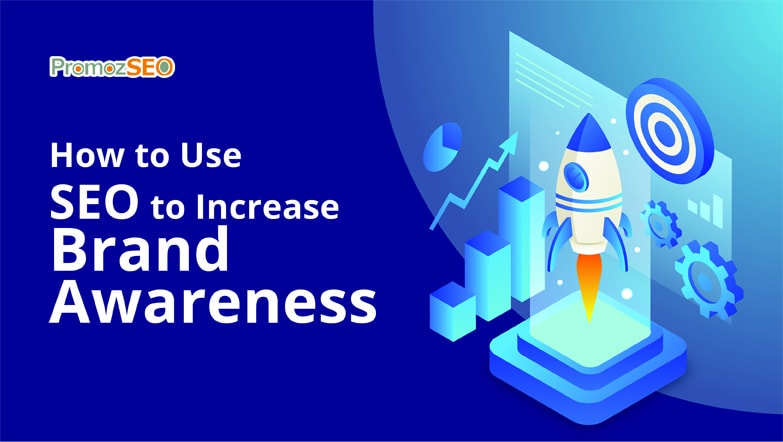How to Use SEO to Boost Brand Awareness

The success of any business or brand largely depends on brand awareness, and that is no news. The more people know about your brand, the more likely they are to do business with it. In today’s crowded market, making yourself seen and heard is not an easy task. There are many different marketing strategies to choose from that can help expedite the increase of your brand’s awareness. However, more often than not, these strategies can cost you an arm and a leg, and the results they bring along might not even be what you were hoping for. Because of this, most digital marketing specialists would agree that using SEO to increase brand awareness is your best bet. Some would even go as far as saying brand awareness is not possible without it.
So, what does search engine optimization bring to the table that other forms of marketing don’t? The answer to this question is organic traffic. Why should you care about organic traffic? Because behind it are real people with real needs, and if your brand can satisfy those needs, a win-win situation is bound to occur. With that said, in an ever-changing world of SEO, staying on top of current trends is of the utmost importance since last year’s tactics might not be as effective today. This article will fill you in on everything you need to know.
Link Building
The idea of other websites linking to your company’s website is called link building. Its importance within the SEO realm is immense because Google sees this kind of activity as highly flattering toward your brand. In other words, link building increases your brand’s credibility and value which is a crucial step in boosting its awareness. However, before you even think about including your links in other websites, there are a few things to which you should pay attention.
Audience
Knowing what kind of audience you’re looking to acquire is vital in any link-building venture. To put it simply, if you are trying to sell moving services in America, a Japanese audience probably won’t help you do that. Therefore, targeting the right crowd is much more important than targeting as many people as possible. This kind of approach will save you not only time but resources and nerves as well.
Websites
Once you have the right target audience in mind, finding good websites which will include your links should be your next step. In this case, good websites are the ones that are relevant to your audience, which once again proves the importance of a well-targeted crowd. When reaching out to website owners, make sure your messages are thoughtful, kind, and, most of all, personalized.
Quality Content
Your efforts to find the right people and websites will be futile unless you have high-quality content. Although most people find writing to be intimidating, know that good grammar and a well-thought-out composition will take you a long way. Everything else is a matter of practice and improving your writing style.
Keywords
Digital marketing experts say that building your website and content around specific keyword phrases will do wonders in improving your SERP ranking. Nonetheless, this doesn’t mean you should mindlessly flood your pages and posts with keywords and hope for the best. Not only will you put off the reader and discourage them from interacting with your brand, but you will confuse Google as well, which will result in low rankings. A good rule of thumb in regards to keyword density is no more than 2%, experts say.
Title
Saying that the title of your page is essential for Google rankings is an understatement. Always make sure to use your keywords in the title, as this is the first thing Google will look at before figuring out how to rank you. A title without the essence of the page will not encourage the user to read the body either. And don’t forget about the title tags. These easily overlooked details determine whether or not a potential consumer will click on your link.
Meta Description
A meta description is a summary of your page. While search engines do not find it relevant when it comes to ranking, users do. A meta description that best describes what the user is searching for will win the competition of choosing what to click on and read. If using some of your keywords makes the description less inviting, it is safer to avoid them.
Body
Including keywords in the body of your page is crucial when using SEO to increase brand awareness. Make sure to use your keywords at least once in the first and last paragraph, as well as a few times in between, depending on the length of your content.
Long-Tail Keywords
Long-tail keywords are just what the name implies – longer, more specific phrases that people use when they are close to making a purchase. They allow you to get in touch with a more narrow group of people who are more likely to convert to customers. Additionally, long-tail keywords can keep you one step ahead of your competition.
Brand Keywords
If you are trying to increase brand awareness, it is likely that your brand is not something with which many people are familiar. Because of this, you shouldn’t oversaturate your content with brand keywords. While a brand is growing, overuse of brand keywords can do more harm than good. You want to work on introducing yourself to potential customers first.
Aside from using keyword phrases in ways that seem natural to readers and Google, another thing you should work on is choosing the right keywords. It probably goes without saying that the best way to do so is to think like a user. Easier said than done, right? Getting into your desired audience’s mind is a skill that requires some practice, but there are ways to get the hang of it faster. If you have a clear intention for your business in mind, you can easily do a bit of keyword research, giving you insight into an average user’s thought process.
Social Media
While using SEO to increase brand awareness is a profitable strategy, you should never forget that SEO pairs remarkably well with social media. Much like wine and cheese – both are good, but together they are amazing! In a world where Facebook, Instagram, and other social outlets are what we turn to first thing in the morning and the last thing we check before going to bed, there is no doubt that their power to increase brand awareness is out of this world. Just think about it – social media is all about people; therefore, there are not many better places to acquire a big audience. Aside from helping you find the right people, social media can make it much easier to connect with your audience, and that is perhaps even more important. If that doesn’t persuade you to work on improving your socials, remember that this is a place where you can get an insight into your competition, as well as instant feedback from your consumers.
It is vital to remember that you cannot create a solid social media presence overnight. It takes time to gain followers, build trust, and spark people’s interest. The first step to that is being consistent with posting. With that said, quantity doesn’t necessarily mean quality. Your content on social media should be relevant, adaptable, and sensitive to current happenings in the world. A message that you send out can easily make or break your business. Know that messages are changing amid the global pandemic, so promoting social awareness and distancing through your social media will make you seem trustworthy and reliable, whereas the opposite will likely be off-putting to potential consumers.
Another perk that social media provides for increasing brand awareness is sponsored social media
posts. This is where you need to put your keywords and hashtags to work, as this combination can make your organic reach go through the roof. Rules for using SEO to increase brand awareness largely apply to social media as well. However, remember that Facebook, Instagram, Twitter, etc., don’t fall into a one size fits all category when it comes to posting. While Instagram is picture-based, Twitter utilizes short but powerful messages. Make sure to tailor your posts to each platform individually – otherwise, your messages might not be conveyed in the right way.
Optimized Content
You’ve probably realized so far that content matters. And what matters even more is optimized content. This means that when using SEO to increase brand awareness, you should never overlook optimizing all parts of your content, as this can cost you a good SERP ranking. Optimize everything from titles to pictures and URLs, use internal links, and make sure your website is user-friendly on all devices.
Since outdated content can be somewhat misleading and even damaging for your brand, remember to keep it fresh and relevant. Sometimes this means you will have to change a few sentences in your blog posts to improve the grammar, and other times you will have to delete irrelevant content altogether.
Following your stats and analytics will ensure you stay on top of anything that needs to be changed or improved. Increasing brand awareness is not something you should do intuitively. Once you know which aspects of your online presence are underperforming, it will be easier to focus your attention and resources on fixing them. You will also be more encouraged to keep using the tactics that bring in good results.
Top of the funnel content
Creating top-of-the-funnel content is paramount when trying to increase brand awareness. It is easy to understand why you want to lure potential customers to the top and eventually lead them to the bottom, where they finally decide to become consumers. Once again, know that relevant content that is of interest to your audience is essential.
Avoid Unethical SEO
Using SEO to increase brand awareness is a strategy that has proven to be effective. However, it does take some time and effort to notice its benefits. For this reason, many people decide to cheat the system and achieve faster and cheaper results by using unethical strategies. These strategies consider using non-organic content and techniques that Google finds very offensive. Not only are these techniques unethical and dishonest, but they can bring some severe damage to your brand as well. Instead of improving search ranking, unethical strategies will lower them. They can even lead to the complete disappearance of your website from search engines. The results they provide are almost exclusively temporary, as well. Consumers will surely be put off once they notice they are being deceived and lied to, which often leads to your brand’s image staying permanently damaged.
So what exactly should you avoid?
- paying for link building
- low-quality content that doesn’t satisfy the intent of the user
- misleading linking
- spam content
- keyword stuffing
Negative SEO
In the aggressive business world, not only do you have to play fair, but you have to make sure your competition plays fair as well. It might sound childish, but negative SEO is a tactic which many use to discredit their competitor’s credibility and hard work. By making you look like the bad guy, they are ensuring your website gets penalized. This can be done either by falsely reporting unethical strategies or making Google think the website is going against SEO’s terms and conditions. White hat SEO does require some financial investment, but its results are what will help you grow.
In conclusion
Using SEO to improve brand awareness is a steady process that is probably more complex than you think. With that said, the results you can achieve by applying savvy SEO strategies are unprecedented. Since digital marketing is still a relatively new line of work, there is always space for improvement. In an ever-changing world of SEO, following the trends and updating your content when needed is of the utmost importance. Don’t be afraid to try a few tactics and make a few mistakes. Only by doing this will your brand be able to survive in the highly competitive global market.
An advanced All-in-One Digital Marketing Course.
Mentored by Mr. Soumya Roy, the Founder, CEO of PromozSEO Web Marketing Academy.
- Reasons Your Business Needs to be on Instagram - September 16, 2021
- 7 Reasons Your Business Should Invest in Professional Content Creation - August 12, 2021
- 5 Ways You Can Improve Your Website’s Existing Backlinks - April 30, 2021





